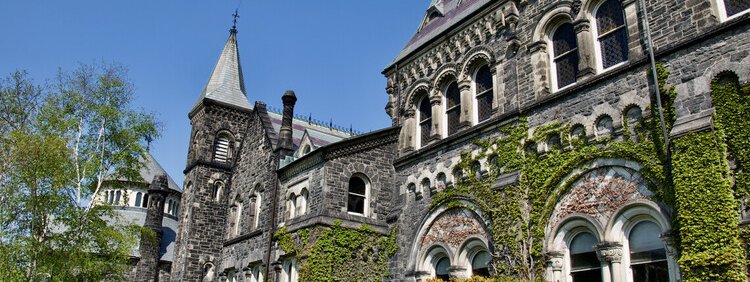Dear Interactions readers,
I am very pleased and honoured to be serving as newly-appointed Chair of the wonderful Department of Physics at the University of Toronto. One of the special treats in this position is to share with you, through the latest edition of Interactions, what’s going on in our busy and engaged Department.
The intense start of an academic administrator’s term features many new policies, procedures, facts, figures, signatures, names and friendly faces. I want to thank outgoing Chair Prof. Kimberly Strong and her administrative team for their wonderful help and support as I’ve moved into this busy office. We have just held an event recognizing Kim and team’s work over the last several challenging years and will include a write-up on it in the next issue of Interactions.
It’s been gratifying and fun to learn how our Physics Department works within our buzzing Faculty of Arts and Science and the broader university, how we relate to our tricampus Graduate Department units, and how our work connects to other cognate and interdisciplinary Departments, Centres, Colleges, and Institutes across the University. Reading through this issue of Interactions reminds me of how proud we can all be of this Department, its accomplishments, its community, and its role at the University of Toronto.
I note some of the many highlights to be found in this issue:
- A nice introduction to our newest Faculty member, Assistant Prof., Continuing-Stream Teaching-Stream, Matthew Robbins (link), in which we learn about his academic background, how he discovered his passion for Physics teaching, and his favourite board game!
- Insightful profiles with postdoctoal fellow Christian DiMaria (link) and doctoral candidate Julian Nickel (link), who provide us with thoughtful perspectives on their lives inside and outside of Physics, including reflections on professional development, engaging in community advocacy, and creating a fulfilled life.
- A profile of Emeritus Prof. David Bailey’s career, pre- and post-retirement (link), which includes his work in creating and running the Pursue STEM program for Black high school students. We are fortunate to have models of Departmental engagement like David in our community.
- Many awards and recognitions for our students, staff, and faculty, including the outstanding news that both Prof. Hae-Young Kee and Kent Moore have been appointed as Fellows of the Royal Society of Canada (link)!
- An overview of the goings-on at the CQIQC-X Conference (link). This impressive interdisciplinary event featured excellent overviews of work in Quantum Information Science. I was happy to attend Bell Prize winner Prof. John Preskill’s lecture, which I encourage you to watch (link) and which he delivered with insight, warmth, and humour.
- Our Department’s great program of engagement in Outreach (link), through Science Rendezvous, Doors Open, Science Unlimited, and our school visits program.
- Our undergraduate program’s community work, from career development with PhysCAP (link) to the many activities of the PhysU student union (link).
- And one last highlight, but certainly not the least: Prof. Peter Krieger’s fine contribution on the retirement of Prof. Bob Orr (link) and his distinguished career as a scholar, teacher, and colleague. While we call this a departure, we’re very grateful for Bob’s continued active work in supporting experimental High Energy Physics in our Department and in Canada.
To conclude, I wanted to mention the wonderful news of University Prof. Emeritus Geoff Hinton of Computer Science being awarded the 2024 Nobel Prize in Physics for foundational discoveries and inventions that enable machine learning with artificial neural networks, along with Prof. John J. Hopfield of Princeton University. This is a tremendous recognition of Prof. Hinton’s scientific brilliance and creativity, coupled with his decades of persistent effort, in developing and applying the techniques of machine learning with artificial neural networks. It is gratifying to see our good colleague’s contributions recognized in this way. The prize provides a reminder of the contribution of fundamental physics to this revolutionary advance, which extends into many fields. It also recognizes foundational contributions outside of Physics that are driving fundamental advances in our discipline and many other fields. This includes work on protein folding recognized in this year’s Nobel Prize in Chemistry and advances that led to large-language models and their implementation in platforms like ChatGPT. That Prof. Hinton has articulated the range of benefits and risks to society of his foundational work only adds to his merit in receiving this recognition. Advances in machine learning and artificial intelligence are already affecting many aspects of our research, teaching, and scholarship in ways we will be discussing for many years to come.
For his achievements and foresight, we wish Geoff warm congratulations from all of us in the Department and from the entire Physics community. Please stay tuned for celebrations of Prof. Hinton’s achievements in the coming months.
I welcome your contact and comments – you can reach me at physics.chair@utoronto.ca. And please get in touch with Interactions via our editor, Supreet Randhawa, at newsletter@physics.utoronto.ca, with your comments and news.
Regards,
Professor & Chair

